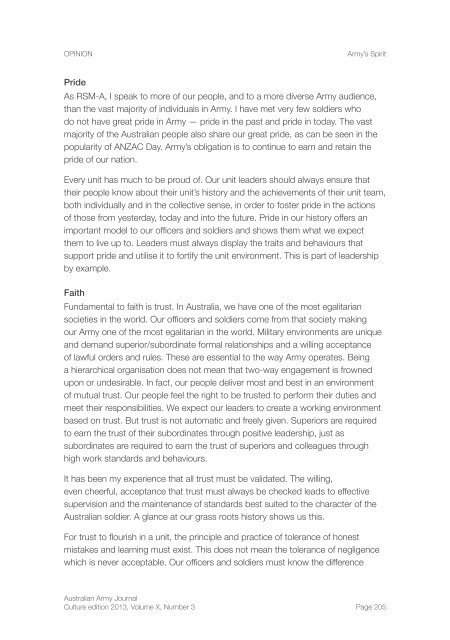Australian Army Journal
Australian Army Journal
Australian Army Journal
Create successful ePaper yourself
Turn your PDF publications into a flip-book with our unique Google optimized e-Paper software.
OPINION<br />
<strong>Army</strong>’s Spirit<br />
Pride<br />
As RSM-A, I speak to more of our people, and to a more diverse <strong>Army</strong> audience,<br />
than the vast majority of individuals in <strong>Army</strong>. I have met very few soldiers who<br />
do not have great pride in <strong>Army</strong> — pride in the past and pride in today. The vast<br />
majority of the <strong>Australian</strong> people also share our great pride, as can be seen in the<br />
popularity of ANZAC Day. <strong>Army</strong>’s obligation is to continue to earn and retain the<br />
pride of our nation.<br />
Every unit has much to be proud of. Our unit leaders should always ensure that<br />
their people know about their unit’s history and the achievements of their unit team,<br />
both individually and in the collective sense, in order to foster pride in the actions<br />
of those from yesterday, today and into the future. Pride in our history offers an<br />
important model to our officers and soldiers and shows them what we expect<br />
them to live up to. Leaders must always display the traits and behaviours that<br />
support pride and utilise it to fortify the unit environment. This is part of leadership<br />
by example.<br />
Faith<br />
Fundamental to faith is trust. In Australia, we have one of the most egalitarian<br />
societies in the world. Our officers and soldiers come from that society making<br />
our <strong>Army</strong> one of the most egalitarian in the world. Military environments are unique<br />
and demand superior/subordinate formal relationships and a willing acceptance<br />
of lawful orders and rules. These are essential to the way <strong>Army</strong> operates. Being<br />
a hierarchical organisation does not mean that two-way engagement is frowned<br />
upon or undesirable. In fact, our people deliver most and best in an environment<br />
of mutual trust. Our people feel the right to be trusted to perform their duties and<br />
meet their responsibilities. We expect our leaders to create a working environment<br />
based on trust. But trust is not automatic and freely given. Superiors are required<br />
to earn the trust of their subordinates through positive leadership, just as<br />
subordinates are required to earn the trust of superiors and colleagues through<br />
high work standards and behaviours.<br />
It has been my experience that all trust must be validated. The willing,<br />
even cheerful, acceptance that trust must always be checked leads to effective<br />
supervision and the maintenance of standards best suited to the character of the<br />
<strong>Australian</strong> soldier. A glance at our grass roots history shows us this.<br />
For trust to flourish in a unit, the principle and practice of tolerance of honest<br />
mistakes and learning must exist. This does not mean the tolerance of negligence<br />
which is never acceptable. Our officers and soldiers must know the difference<br />
<strong>Australian</strong> <strong>Army</strong> <strong>Journal</strong><br />
Culture edition 2013, Volume X, Number 3 Page 205

















